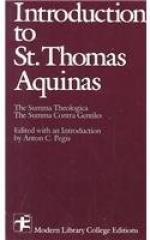
|
| Name: _________________________ | Period: ___________________ |
This quiz consists of 5 multiple choice and 5 short answer questions through Chapter 19, Human Acts: Questions 6, 8 & 9 Chapter 20, Questions 12, 13 & 18Chapter 21, Questions XX, XLIX, LI, LIV, LV, LVI, LVII.
Multiple Choice Questions
1. What is the reason why God has no name, or is said to be above being named?
(a) He is an abstract concept.
(b) He does not like being named.
(c) His essence is above all that we understand about God and signify in words.
(d) He has many names.
2. Thanks to ______________, he becomes aware of some ancient thinkers outside of Scriptures as well as inside them.
(a) Aquinas' friends.
(b) Aquinas' family.
(c) Aquinas' education.
(d) Aquinas' intelligence.
3. Aquinas sees individuating qualities as signs of _____________________ rather than as the type of separation associated with biological and social organizations.
(a) Fundamental separateness.
(b) Unnatural separateness.
(c) Unnatural togetherness.
(d) Fundamental togetherness.
4. The divine essence is compared with what?
(a) Dark.
(b) Prayer.
(c) Light.
(d) Love.
5. What is the Summa Theologica part of?
(a) A new tradition.
(b) The Koran.
(c) The Bible.
(d) A long tradition.
Short Answer Questions
1. According to Aquinas, Aristotle says that the soul is only separable from the body inasmuch as what?
2. How many objections and replies exist in Third Article: Whether Choice is Only of the Means to the End or Sometimes also of the End?
3. Choice is the theme, and what is 'choice' described as?
4. The intellect gives virtue and power to the soul, but is the intellect the soul in and of itself?
5. Aquinas also believes that humans do perceive the same principles when they use_______________ thought.
|
This section contains 286 words (approx. 1 page at 300 words per page) |

|




